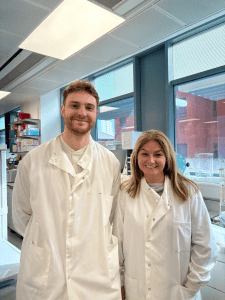The challenge
Ewing sarcoma is a rare and aggressive cancer that mostly affects children, teenagers, and young adults. Even when it is treated successfully the first time, it can often come back. Sadly, when this happens, there are very few treatment options.
To improve outcomes, new treatments are needed that can destroy the cancer and stop it from returning. One promising approach is immunotherapy, which helps the body’s own immune system fight the cancer. However, Ewing sarcoma is good at hiding from the immune system, making it hard for immune cells to recognise and attack it.
How will this project tackle this challenge?
The team is exploring a type of immunotherapy called oncolytic viruses, these are viruses that can infect and kill cancer cells without harming normal cells. The viruses work in two ways: they can directly burst cancer cells, and they can also attract immune cells to the tumour to help fight the cancer.
However, the team previously discovered that Ewing sarcoma cells can form a protective shield made of proteins, called the extracellular matrix (ECM). This shield prevents immune cells from reaching the cancer, reducing the effectiveness of the treatment.
In this project, the team will look for the best protein-cutting enzymes to break down this barrier. They will then arm the oncolytic virus with this enzyme, with the hope that it can both break down the ECM and kill cancer cells. This would allow immune cells to reach the tumour and attack it more easily.
What this means for people affected by sarcoma
This research could lead to a potential powerful new treatment that helps fight Ewing sarcoma more effectively. By combining virus therapy with a way to break the tumour’s defences, this approach could reduce the chance of the cancer coming back and improve long-term outcomes.
The viruses used in this study have already been tested safely in other cancers, which could support moving this treatment option into clinical trials in the future if it is effective in the lab.










